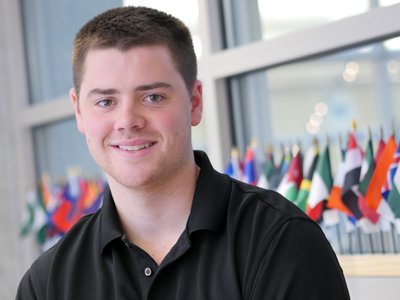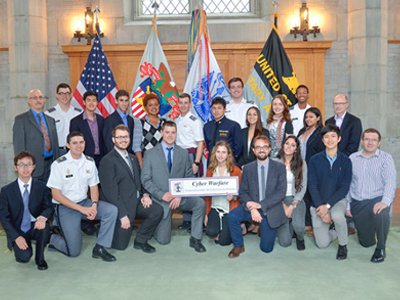A Seat at the Big Table
Ryan Hackett ’16 shares how recent Student Conference on US Affairs helped to solidify his post graduation plans

Ryan Hackett ’16 may still be several months from graduation, but he’s already putting his post-Syracuse plans in motion.
Hackett, a student in the College of Arts and Sciences and the Maxwell School of Citizenship and Public Affairs is a double major in political science and international relations. He was recently selected to represent Syracuse University at the 67th annual Student Conference on US Affairs (SCUSA) held at the United States Military Academy at West Point.
Held each fall, SCUSA is a four-day conference designed to stimulate thoughtful discussions between civilian students and West Point cadets about the challenges the United States faces in an increasingly interconnected global society.
The theme of this year’s conference was "Confronting Inequality: Wealth, Rights, and Power." Within that topic, student delegates were invited to participate in one of several smaller roundtable discussions, ranging from European security and defense, to the effects of climate change on the global poor. Hackett says that his participation in the cyber warfare roundtable was a good fit for his current academic pursuits at Syracuse University.
“SCUSA 67 was perhaps one of my greatest college experiences thus far,” explains Hackett, a native of Branford, Connecticut. “All the conversations that I had, relationships that I made, and lessons learned will certainly benefit my future in many ways.”
With a regional concentration in the Middle East/ North Africa and a topic concentration in International Security and Diplomacy, Hackett most recently studied abroad with the Maxwell-IDC program at the Lauder School of Government in Herzilya, Israel. Prior to that expereince, he completed his capstone project on state responses to ISIL (Islamic State of Iraq and the Levant). It’s these accomplishments that played very well in his selection for the SCUSA conference.
“Ryan is an excellent example of our deeply engaged international relations majors,” says Mary Lovely, Chair of the International Relations Program. “The SCUSA 67 conference gave this ambitious and talented student the opportunity to practice the analytical, collaborative, and writing skills he has built through his study here at Syracuse.”
The College of Arts and Sciences caught up with Hackett upon his return to learn more about his experiences and what he took away from his participation at the conference.
How did you come to be chosen to participate this year’s Student Conference on US Affairs (SCUSA)?
I was made aware of the opportunity to apply for SCUSA 67 by my advisor, Francine D’Amico, associate professor and undergraduate studies director in the International Relations Program at Maxwell. To fulfill the application requirements, I had to submit my resume and a small form where I explained how my past experiences make me an ideal candidate to attend SCUSA 67. This past May, I studied abroad in Israel at the Lauder School of Government where the focus of the Maymester was on Middle East policy and terrorism. When I returned from Israel, I spent the remainder of my summer in Washington, D.C. working as a policy assistant for Connecticut Governor Dannel Malloy’s office. Combined with my academic success at Syracuse so far, the work I did in Israel and all that I was a part of in Washington definitely played a major role in my selection for SCUSA 67.
Tell us about your experience at the conference… what were the most memorable moments for you over the week?
At the conference, there were about 230 students from 120 plus schools from all over the world. Compared to many of the other 14 roundtables at the conference, my Cyberwarfare group was definitely the most diverse, both culturally and academically. Though a majority were from the United States, my table was lucky enough to have participants from Italy, China, Japan and Colombia. Such a diverse group of individuals made the discussions very intense and informative, yet fun at the same time. Coupled with that, the cadets who ran our roundtable were all on the West Point Cyber Team, so their contributions came in the form of much more specialized technical expertise on cyber issues. Furthermore, the two co-chairs, Dr. Martin Libicki and Dr. Andrew Ross, are two scholars whom I have previously cited on multiple occasions in academic papers, so I was very excited to talk and discuss issues related to cyber with them in person.

As a whole roundtable, we wrestled with trying to create a group policy paper that would address the security dilemma that cyberwarfare creates for the world today. We discussed topics such as the importance of consistent definitions, attribution, state and non-state threats, information sharing, and developing new norms for the international community. Additionally, our team managed to establish a means to create a cooperating international force to defend against both state and non-state actors that looked to use the dark cyber world to their advantage. Perhaps the best part of the roundtables was that often times the co-chairs let the students take control of the debate. However, they would often interrupt and give their opinion to challenge our thoughts and opinions. On multiple occasions, I found myself in a very tense yet diplomatic discussion with the co-chairs. These men work daily with military officials, heads of state, and other elites all around the world. It was a great feeling to know I had developed the ability to sustain and contribute to such conversations.
To top off the great conference, former Secretary of State Madeleine Albright was the keynote speaker on Thursday night. Beginning her speech with some stories from her time at the State Department, Secretary Albright presented a nice blend of humor and seriousness as she discussed problems of inequality that exist in not only the United States, but throughout the whole world today. She addressed topics including women’s rights, regime types, climate change, and education to name a few. She ended her speech by commending all of our efforts at the conference and made sure we understood her confidence in our generation’s ability to solve the complexities of the future.
How has participating in the conference changed your outlook regarding your future career?
Participating in the conference further reassured my decision to pursue a career associated with domestic and foreign affairs. Being on the cyber roundtable made me realize that though I lack a technical expertise in cyber related issues, I still possess the ability to apply all that I have learned at Syracuse to present and future matters that our country and world will have to deal with. Currently, I am in the process of applying to Officer Candidate School for the U.S. Navy where, if hopefully accepted, I can begin a career where foreign affairs will greatly impact all that I will be a part of and wish to accomplish. No matter what I end up doing, I want to be able to use my knowledge and skills for the greater good and serve and protect those who need it the most.
What are your reflections on being a part of the Cyberwarfare roundtable?
In my opinion, I believe Syracuse, and Maxwell in particular, could only benefit from perhaps having cyber policy related courses for undergraduates. I understand that there are many opportunities for Graduate students to pursue their interests with cyber related topics, but from listening to other students at the conference and all the issues that were brought up, I firmly believe that the cyber world will only expand.
What advice would you impart to future students interested in these topics?
I strongly recommend attending SCUSA if the opportunity ever presents itself to a student in the future. Not only will it make anyone a stronger and more knowledgeable student and person, but more importantly, having the opportunity to live with and be immersed within the life of the military cadets truly will cause you to appreciate the sacrifices that people our age decide to make for our country every day.
Media Contact
Amy Manley
